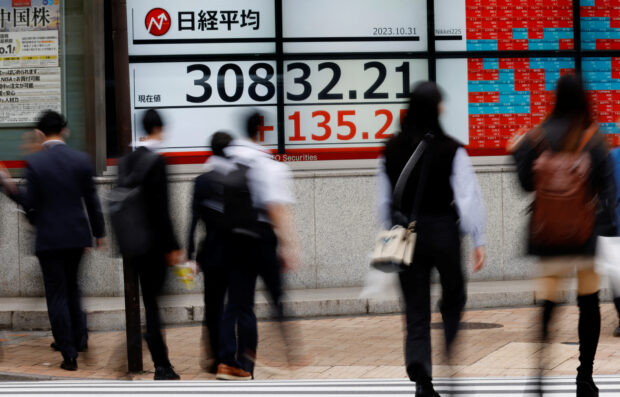Bonds cheer Fed talk of cuts; kiwi flies

Pedestrians walk past an electronic board displaying Nikkei share average, outside a brokerage in Tokyo, Japan, Oct 31, 2023. REUTERS/Kim Kyung-Hoon/File photo
SINGAPORE -Treasury yields and the dollar hit multi-month lows on Wednesday after a Fed official made fresh hints of U.S. interest rate cuts, while the New Zealand dollar jumped after its central bank said another hike may be necessary if inflation proves stubborn.
In Asia, MSCI’s broadest index of Asia-Pacific shares outside Japan briefly hit a one-week high, before weakness in Hong Kong tech shares dragged it to a 0.3-percent loss.
Japan’s Nikkei fell 0.3 percent.
The New Zealand dollar was last up 0.9 percent , having blown past resistance to top 62 U.S. cents and make a four-month high.
The euro, yen, sterling, Australian dollar, yuan, Swiss franc and a host of Asian emerging market currencies also made fresh multi-month peaks on the dollar, while gold shot to a seven-month high above $2,501 an ounce.
Federal Reserve Governor Christopher Waller – an influential and previously hawkish voice at the U.S. central bank – told the American Enterprise Institute on Tuesday that rate cuts could begin in a matter of months, provided inflation keeps easing.
Fed funds futures rallied on the remark to price more than hundred basis points (bps) of cuts in 2024 and a 40% chance they begin as soon as March. Two-year Treasury yields fell sharply and touched fresh lows in the Asia session.
“The market clearly moved on Governor Waller’s opening up the possibility of cuts,” said Tapas Strickland, head of market economics at National Australia Bank in Sydney. Waller’s remark echoed earlier comments made by Fed Chair Jerome Powell.
The two-year yield hit its lowest since mid-July at 4.69 percent and the benchmark 10-year yield fell 6 bps to its lowest since September at 4.28 percent .
The dollar was last down 0.2 percent at 147.15 yen, having earlier in the day traded at its lowest since Sept. 12 at 146.68. It touched a 3-1/2 month low at $1.1017 per euro.
Conditionality
Waller’s remarks extended what has been a two-week rally in stocks and bonds around the world since a benign U.S. inflation report two weeks ago — except in China where doubts about the economy and a deepening property crisis have investors decidedly downbeat.
Global stocks are up almost 9 percent in November and are tracking toward their best month in three years. The Hang Seng is down 0.4 percent and hasn’t posted a positive month since July.
The latest negative news came from Meituan which flagged slowing fourth-quarter growth for its mainstay food delivery business. Its shares collapsed 12 percent to a 3-1/2 year low on Wednesday, despite the company promising a $1 billion buyback.
The Hang Seng fell 2.4 percent on Wednesday. Hong Kong interbank rates are at 23-year highs, suggesting cash is draining out of the Asian financial hub and flagging pain for mortgage holders whose payments are often tied to one-month rates.
Mainland China blue chips fell 1 percent and are heading for a fourth monthly decline in a row with a 2.5 percent fall in November.
Some analysts are also wary that markets have run with parts of Fed officials’ remarks — flagging possible rate cuts — even though the comments have been conditional on further declines in inflation and on financial conditions staying restrictive.
New Zealand sounded something of a warning note on Wednesday when the central bank slightly lifted its interest rate projections and warned hikes may not be over.
“Bets ought to be guided by conditionality that policy is appropriately tight, not indulged with abandon on over-confidence that Fed is done (premised on linear projections of dis-inflation),” said Mizuho economist Vishnu Varathan.
Elsewhere, Australian inflation eased by more than expected.
In commodities, Brent crude futures steadied at $81.63 a barrel ahead of a crucial OPEC+ meeting on Thursday to decide output policy in the next months, but prices were set for a monthly drop, while Singapore iron ore futures are up 9.6 percent in November at $130.50 a tonne.